|
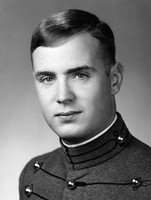
(...Speakers on please...)
West Point Graduate, 1967 Vietnam, 1968
.jpg) .jpg)
First Lieutenant
HHB, 2ND BN, 9TH ARTY RGT, 4 INF DIV
Army of the United States
19 June 1945 - 25 September 1968
Troy, NY
Panel 42W Line 011,Vietnam Memorial

The Vietnam Wall, Washington DC
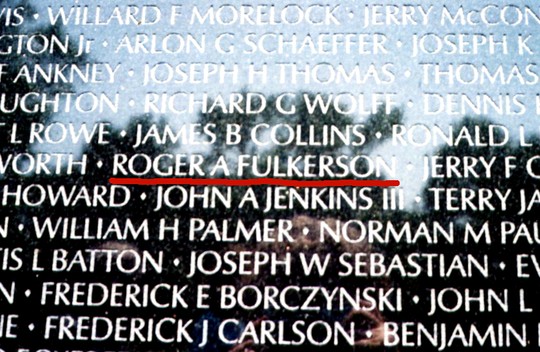
And when our work is done,
Our course on Earth is run,
May it be said, "Well done:
Be thou at peace." West Point Memorial |
.jpg)
The Young Dead Soldiers Do Not Speak
The young dead soldiers do not speak.
Nevertheless, they are heard in the still houses:
who has not heard them?
They have a silence that speaks for them at night
and when the clock counts.
They say: We were young. We have died.
Remember us.
They say: We have done what we could
but until it is finished it is not done.
They say: We have given our lives but until it is finished
no one can know what our lives gave.
They say: Our deaths are not ours: they are yours,
they will mean what you make them.
They say: Whether our lives and our deaths were for
peace and a new hope or for nothing we cannot say,
it is you who must say this.
We leave you our deaths. Give them their meaning.
We were young, they say. We have died; remember us.
~ written by Archibald MacLeish
**********************************************************
TROY HIGH SCHOOL HIGHLIGHTS:
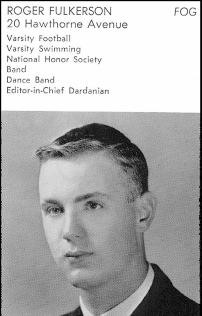
Roger graduated with honors in the top 10 of his class of 268 members from Troy High School in 1963. During his time at THS, he was a member of the Varsity football and Varsity swim teams. In addition to sports, Roger was the Editor-In-Chief of The Class of 1963 Dardanian Yearbook and was inducted into the National Honor Society. He was part of the Troy High debate team and was a drummer in the high school band and dance band. He received a New York State Regents College Scholarship and had college acceptances with scholarship offers from Dartmouth, Hamilton, Syracuse, and the US Military Academy at West Point.
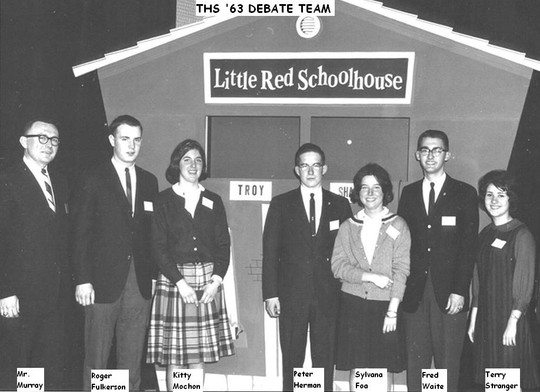
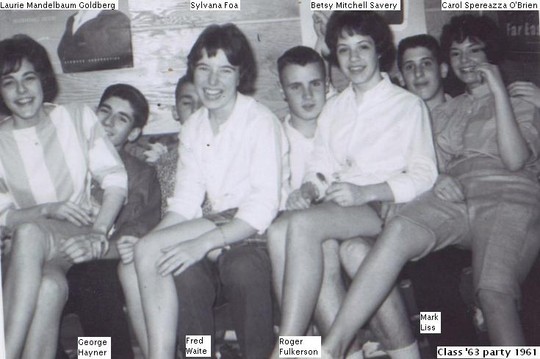
One of many '63 parties during high school
WEST POINT HIGHLIGHTS:
Roger entered the United States Military Academy at West Point in July of 1963, and graduated in 1967 with an engineering degree. While at West Point, he was a member of the bowling club, cadet band, riding club, karate club, and German club.
AFTER WEST POINT HIGHLIGHTS:
After graduation from West Point, Roger attended artillery school at Ft. Sill, Oklahoma, and then volunteered for airborne school at Ft. Benning, GA. He took ranger training in Georgia and Florida.
VIETNAM TOUR OF DUTY:
Roger began his tour of duty in Vietnam in July of 1968, serving as a forward observer with C Company, 2nd Battalion, 35th Infantry of the Fourth Infantry Division. On September 25, 1968, a little over two months after his deployment to Vietnam, he was killed in action during a battle with hostile forces near Duc Lap and the Cambodian border. First Lieutenant Roger Fulkerson was posthumously awarded the Bronze Star with V device for Valor, Bronze Star for Meritorious Service, Purple Heart, National Defense Service Medal, Vietnam Service Medal, Vietnam Campaign Ribbon, Combat Infantryman's Badge, Parachutist Badge, Expert Rifle Badge, and the Ranger Tab.
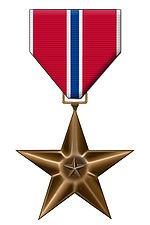
Bronze Star
The Bronze Star is awarded for "heroic or meritorious achievement or service resulting from an act of combat heroism." The Bronze Star is the fourth highest combat award of the US Armed Forces and the ninth highest military award in the order of precedence of US military decorations.
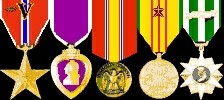
Roger's Medals
(L to R): Bronze star with V device for valor, Purple Heart, National Defense Medal, Vietnam Campaign Medal, Vietnam Service Medal. Not shown: Vietnamese Gallantry Medal (presented by the country of Vietnam).
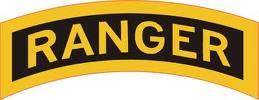
Ranger Tab
The Ranger Creed
Recognizing that I volunteered as a Ranger, fully knowing the hazards of my chosen profession, I will always endeavor to uphold the prestige, honor, and high "Esprit de Corps" of the Rangers. Acknowledging the fact that a Ranger is a more elite soldier who arrives at the cutting edge of battle by land, sea, or air, I accept the fact that as a Ranger, my country expects me to move further, faster, and fight harder than any other soldier. Never shall I fail my comrades. I will always keep myself mentally alert, physically strong and morally straight and I will shoulder more than my share of the task, whatever it may be. One hundred percent and then some. Gallantly will I show the world that I am a specially selected and well trained soldier. My courtesy to superior officers, neatness of dress and care of equipment shall set the example for others to follow. Energetically will I meet the enemies of my country. I shall defeat them on the field of battle for I am better trained and will fight with all my might. Surrender is not a Ranger word. I will never leave a fallen comrade to fall into the hands of the enemy and under no circumstances will I ever embarrass my country. Readily will I display the intestinal fortitude required to fight on to the Ranger objective and complete the mission, though I be the lone survivor.
ROGER'S FAMILY:
Roger was the son of the late William and Dorothy Fulkerson. He is survived at this time by his sister, Amy Fulkerson Hatfield (THS '67), of Granby, CT, and by his daughter, Lynne Krause, of Woodland, CA.
Amy (Roger's sister), Bill (Roger's and Amy's Dad), Dorothy (Roger's and Amy's Mom), and Roger: Christmas 1965
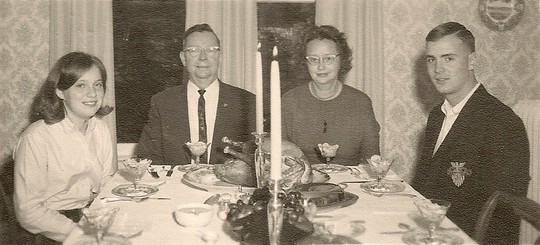
ROGER WAS HONORED IN 2004 (THIRTY-SIX YEARS AFTER HIS DEATH) WITH INDUCTION INTO THE EDWARD C PICKEN TROY HIGH SCHOOL ATHLETIC HALL OF FAME:
Pete Herman accepted Roger's posthumous induction award into the Edward C. Picken THS Athletic Hall of Fame from Brigadier General Clarence B. Hartman, NYG West Point Society of the Capital District.
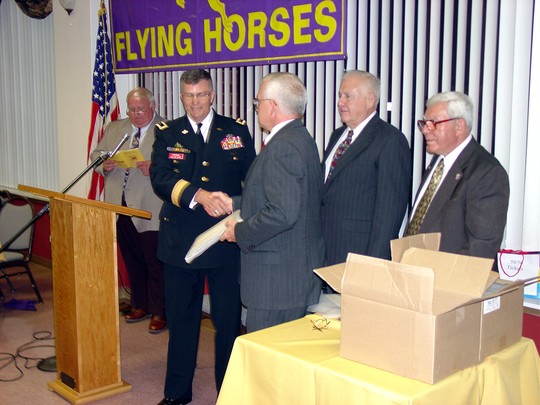
Several of Roger's lifelong friends were present at the Ed Picken THS Athletic Hall of Fame banquet to witness his posthumous induction, including: Elaine (Hogan) and Larry Schlegel, Mike Cunningham, Pete Herman, Leo Derkowski, Wayne Reilly, Carol (Ritter) Graham, Carol (Sperrazza) O'Brien, Nancy (Kinerson) Dwyer, Jim Patch, John Sunukjian, and Betsy (Mitchell) Savery.
******************************************************************
ACCOUNTING OF SEPT. 25, 1968,
ROGER'S LAST DAY:
From an email sent to Lynne Krause (Roger's daughter) by Barry Toll, who served with Roger in Vietnam:
Dear Lynne - Yes, I knew and served with your father and he was a helluva man. Supremely intelligent, always gracious and kindly when appropriate, expertly competent at his job for a young officer, possessed of absolutely impeccable integrity, and of course an exemplary example of the crucible experience of being a West Point graduated officer. There is hardly a month that goes by all these years when I don’t think of Roger, and I should tell you that I have stood at The Wall at least forty times in the last 18 years and touched his name with great pride in my heart for having known him.
Yes….he was quite tall, and wore glasses, and was a handsome man with extremely upright bearing. But Roger’s most shining quality was the aura he projected as a soft spoken, compassionate and civilized human being…that’s what one noticed immediately…and that is often a rare first impression one could get from an officer in combat conditions because of the immense nature of their responsibilities in that most difficult of wars.
Your Dad was an Artillery Forward Observer attached to my infantry company for several months, beginning his duties with us in the infamous Tri-Border region of South Vietnam where the Ho Chi Minh Trail dumped out into South Vietnam from Laos and Cambodia right into our laps, in the Kontum Mountains atop the equally infamous Plei Trap Valley. This has always been the most dangerous of South Vietnam. I was then a draftee, and simple rifleman, combat infantryman, and had the misfortune of joining that company (C Company, 2nd Battalion, 35th Infantry, 3rd Brigade, of the 4th Infantry Division) about two months before Roger arrived, when we had fought a vicious battle up near Dak To (another infamous site in this war, where some of its biggest, most decisive battles were fought over the long years). I had gone up a hill with 125 men the first day I was with the company; five days later, 25 or us remaining, we took the top (not all dead…most of them wounded and evacuated). So I found myself a squad lead er almost immediately.
Roger joined us at a place just east of the Cambodian border, overlooking the Plei Trap Valley, we dubbed “LZ VIRGIN”. There were scarcely 1200 of us, spread along a series of firebases confronting the border regions in the Kontum Mountains, and we were literally facing 60,000 North Vietnamese in the wake of what history calls “The TET Offensive” of 1968. Your dad’s job was to protect the men of our company by pre-plotting and adjusting or spontaneously using his skills when we were on the move, with the artillery to our rear…to bring fires upon the enemy and destroy him, before he could destroy us. And he did so impeccably those months, and they were very busy months where we were outnumbered. Twice, enemy regiments (2000 men) came to swallow us up. Twice, his artillery pre-plots broke up their attacks before they could be fully launched against our tiny mountaintop position, which only held 105 or so of us. Then we went on a secret mission to Cambodia…a “recon in force” operation from LZ Virgin…with only 55 of us. While there, we had enemy battalions (365 men) walk within feet of us while we hid in the jungle. Our job was to observe and report, NOT fight them; bring back the intelligence as to who was in those illegal border sanctuaries in the enemy’s backyard. One night, they came for us…but again, Roger’s artillery pre-plots and adjustments as they tried to work around our flank broke up their attack. The next morning we had to flee from their pursuit up a very famous mountain mass called “The Chu Pong Massif”…from the Cambodian side, where we weren’t supposed to be, but The President had approved the operation in secret. This was in July of 1968, during the hardest fighting period of the war…in 1968, almost twice as many Americans were killed or wounded than in any other one-year period of the long war. We fled up the mountain, NVA pursuing us, with Roger’s artillery slowing down their pursuit. We even marched after dark….then a tremendous deluge, the monsoon, poured upon us all night, concealing us and our night noises from the enemy. I awoke at 0300 hours and the water was so high, although propped against a giant teak tree in the jungle rain forest, the water had reached my mouth and was drowning me!
The next day, we had to literally use mountaineering techniques at times to get back down the mountain and barely get out before the NVA massacred us…but out we got. From this and other intelligence gathered we learned many of the 60,000 enemy facing us at Tri-Border and had moved south for a big, surprise offensive against us, at that place you know now as Duc Lap, about 105 miles south, and due west of Ban Me Thuout, and Darlac, Vietnam, again, dead on the Cambodian border.
They whisked us up in a rush and moved us down there in a frantic hurry, and we began “screening” operations, trying to disrupt the enemy’s infiltration to build and mass for a big battle, by sending out small patrols and using our artillery and mortars and air strikes and gunship to punish him, so he could not complete the offensive plans. One night, I was running what we call a “SRP” patrol (short range patrol of only four men) and had another enemy battalion infiltrate from Cambodia right past my position. With me spotting, and Roger directing, we again broke up their plans.
By that time, they had moved me into the Company Commander’s security group…so your dad and I were spending almost 24 hours a day together. We had become fast friends, in violation of the “over fraternization” principle that was supposed to delineate the relationship between enlisted men and officers. We talked long. We never bitched (except about dumb orders from our higher headquarters). The Duc Lap area was much flatter, but still hilly in spots, and to complicate things there were lots of indigenous villagers around, whereas up north, if we saw someone in the jungle, we KNEW they were enemy, not civilians. In one village, some of the frustrated men captured a montagnard of military age who was running…they’d tried to shoot him, missed, and now he was captured. Some of the younger men wanted to summarily execute the montagnard, believing him to be VC…his family stood by, weeping and pleading. One fellow was about to shoot him when your father and I came upon this situation. I clicked the safety off my M-16 and told him, “If you shoot that ’yard, I’ll kill you on the spot.” The Company Commander, who was nearby within earshot, did nothing to help me. Suddenly your father’s voice from behind me said over my shoulder, “If Circus misses, I won’t”…and there he was, with his CAR-15 leveled at the man beside me. So occasionally we saved a life or two also. After that, no one in the company thought about killing prisoners while we were around.
I don’t know why your dad and I became friends in that horrible situation, in those sorrowful days when our country was falling apart back home and cities were burning in riots and there was so much division within our culture. Yes…we both were extremely intelligent young men who could talk about things most grunts didn’t…but I really think it was our immediate reactions to combat which bonded us…we weren’t heroes…but your dad and I couldn’t stand the screams of suffering and wounded men…so when it got bad, we had to go forward and try to put a stop to the suffering, any way we could…we were scared like everyone else…but we were more scared of not doing everything we could to stop the suffering…of not being true to the values upon which we were raised as compassionate human beings. Some people aren’t lucky enough to have been raised with the same values your dad and I had inculcated within us by our parents and mentors…and I really think that is the quality within us that made us friends in these short, horrific months.
Anyway, one day they gave me some medals from a battle we’d had before your father joined us and he presented them to me and congratulated me as a friend. I had refused to attend the award ceremony and have the general give them to me, insisting in my impetuous youth that “I didn’t do anything any civilized person shouldn’t have done…” and your dad and I were laughing about that, while the Company Commander was scratching his head over it…and suddenly, the word came down from headquarters that a friend of ours, Jerry Pritchard, had to cancel his R&R visit with his wife in Hawaii…and the slot was open. Allocations for Hawaii Rest and Recuperation (five days only…and only for married men who could meet their wives) were rare and precious. We didn’t want to lost it…Pritchard, who was also at the Company command post as a bodyguard for the commander, so he lived with your dad and I each day, said his wife couldn’t make the date which was only five days away. R&R is usually taken in the eighth to tenth month of a Vietnam tour…I was only in my sixth, but my wife was arranging to meet me there in a few months. The Captain said “Can anyone get his wife there in five days?” Your dad looked at me and said “Circus...go for it...get the hell outta here.” So I said, “Yeah Six…I can.” (They called me Circus, because we all called each other over there by nicknames…I had been drafted from a career where I was first a trapeze artist, then a high wire artist in the circus…I was one of The Great Wallendas, at the time, the most famous circus act in the world. Your dad was known by his radio call sign, which was for his Artillery FO position “Six-niner…”). A few hours later, we shook hands about ten kilometers east of Duc Lap and I got on the bird, not knowing if my wife would really be able to make it, and knowing I’d only get one phone call chance to tell her she had to get there in three days, or leave a message for her…three days later I was in Honolulu and she had made it.
On the fifth and last day of R&R I got up in my penthouse in the Outrigger Hotel in Honolulu and packed to go back…the headline of the Honolulu Advertiser slid under the door screamed at me, “Siege At Duc Lap…Special Forces Outpost Overrun by NVA”. The last paragraph of the story said, “Elements of the 173rd Airborne, 4th Infantry Division and Marines are being rushed to relieve the beleaguered camp.” I well knew who those “elements” of the 4th Division were…and fretted all the way back to Vietnam.
Your dad was killed a few days later when an NVA battalion caught the company in perimeter, early in the morning, by surprise. I was not there. The NVA ran into the defensive perimeter before a shot was fired and was in among the positions and a vicious battle, at times hand to hand, ensued. Your father, in the center of the position doing his job directing the artillery from his foxhole, was apparently killed and died instantly when an artillery round, or enemy mortar round, hit a tree limb right above his foxhole and the resulting blast blew straight downward, taking him painlessly and instantly. This is what several of the survivors have told me over the long years.
I had been diverted upon return to Vietnam into a Top Secret program, running reconnaissance missions, sometimes at the President’s direct order, into Laos and Cambodia, back up along the tri-border, in small, four to six man teams, containing only two Americans. Coincidentally, one Captain who had been company commander briefly while Roger and I were together in C Company, was now in my headquarters. One day I was in a horrendous battle where my four-man team was surrounded in Laos by 325 NVA in the middle of the night…we fought all night, barely making it out alive. I was quite bloody and a mess when the helicopters rescued us…and brought me back to the command post for debriefing…that Captain, named Steuber, was standing there to congratulate me on my escape. In that battle, I had used the skills your dad had taught me about how to execute artillery adjustment in a big battle…something an infantryman rarely would get an opportunity to learn…but through long hours, your dad and I talked and I observed. I had learned it from him. So, what your dad taught me saved my life.
That was the day he died, coincidentally, or fittingly, depending on what you believe in your heart and your own spiritualism. Captain Steuber said, “Great job with the five arty batteries (25 artillery pieces firing at once, five guns to the battery)”…I said, “Yeah…Six-niner would have been proud of me,” grinning wildly in the hubris of having escaped death once again. To my shock, Captain Steuber burst into tears, and could not talk, choked up…the Brigade Commander, Colonel Stan McClellan (great grandson of the Union Army Commander, General George McClellan, who missed being President by one vote..so we got Lincoln) turned away suddenly too… Steuber, unable to speak, handed me a handwritten sheet of paper…it was the report of our dead form Duc Lap, just in…of course, your dad’s name was there…along with over a dozen more of my close friends. In the ensuing few days, my former platoon in C Company would be ambushed and 29 out of 31 of them would be killed or wounded…mostly killed. I shall never forget those days.
So now you know why I have visited your dad at Our Wall over forty times these long years. I never go to Washington DC without talking to him there, sometimes late at night when I lived there over the long years, or deep in yogic meditation down in the “V” of where the wall comes together…and I go to Washington a lot.
Your dad and I were soldiers once, and young. Here’s to us, and all those like us. Damn few left.
Your dad was a hero of mine. Later, while stationed at NATO in Europe, they would send us West Pointers on summer internships…I’d always get one, because I had so much combat experience…in 1969, I got one who was in his graduate year…we went to Amsterdam together to raise hell for a weekend…the weekend we landed on the moon for the first time…turned out he knew your dad from West Point and I told him the stories…your dad had mentored him as an underclassman. We cried.
I’m crying now. But they are tears of pride. Yours should be too, Lynne.
Barry Toll
.jpg) 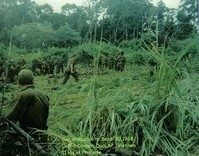
Map showing area Roger's unit was located Battle site where Roger was killed 9/25/68

TRIBUTE FROM DONALD BLANKIN, A FORWARD OBSERVER IN VIETNAM WITH ROGER:
"I served in the Army with Roger Fulkerson in 1968. He and I served as Forward Observers with the 2nd Battalion 9th Artillery regiment. I became his caretaker when he was KIA on 9/25/68 at Duc-Lap. At some point I'll possibly be able to put into words what his sacrifice meant to his fellow Soldiers. I promised Roger, as I sent him back home, that I wouldn't allow him to become forgotten. I must thank Betsy Savery and this class for allowing me to have another opportunity to do this. Roger was a person of courage and conviction. I'm sure if we could ask him today where he got those traits he would say "from my family, friends, and classmates". Celebrate Roger for what he did. It's sad that we lost him, but he provided a great lesson for us and as long as we have these places we still have him. You can visit Roger the Soldier at www.themightyninth.org. It's my hope that each of you remain well and happy with each other."
|
Betsy Mitchell Savery
The following tributes to Roger were published in the formal program of the Awards Banquet at his posthumous induction into the Edward C Picken Troy High School Athletic Hall of Fame in 2004. Tributes below include those written by Pete Herman, Leo Derkowski, Wayne Reilly, Elaine (Hogan) and Larry Schlegel, and Betsy (Mitchell) Savery. My Best Friend – Roger Fulkerson By Pete Herman, THS Class of 1963 From the time Roger came to School 16 until his death, we were best friends. We did many things together, along with Leo Derkowski and Wayne Reilly, including Boy Scout outings and yearly excursions to Camp Rotary, recording skits straight out of “Mad Magazine” onto reel-to-reel tape, and we played lots of sports. Roger was a natural athlete, very coordinated – unlike me. I know he tried to teach me lacrosse, but I couldn’t keep that little ball in the webbing. Despite that, he rarely made fun of me! We even played intramural softball one year at THS– and had a great time. In varsity high school sports, Roger gave his all, as he did with everything he attempted.. He worked hard on the football team, and it was tough for him, because the team didn’t win many games. Roger didn’t like losing and took it personally, mostly by becoming very withdrawn. In swimming, he walked on one year, and became a competent backstroker, always improving his times. Roger was a born leader, in a quiet, dignified way that made everybody want to do their best for him. He was quiet, but behind that was a great sense of humor and a real purpose in life. Tragically he died way too young, a hero even in his last moments. I still miss him, and will continue to do so until we meet again on the other side. Roger would have been honored with his induction! I’m so glad his memory lives on in Troy High School sports. Remembering my friend – Roger Fulkerson Leo Derkowski, Troy High Class of 1963 I met Roger in the fourth grade at School 16 and we were close friends for the rest of his life. Even though we were the same age, I looked up to him as if he were an older brother. He had that affect on people. He seemed more mature, perhaps in part because of his size. Even in grade school he towered over the rest of the guys. But he also had a quiet way of asserting himself as a leader – a role we accepted without complaint or quarrel. Roger was a complex person. He was quiet and reserved as a boy and as a man. And at the same time he had the wildest, raunchiest sense of humor of anyone I’d ever met. He constantly surprised me with just how funny he could be. He was always “just one of the guys” and at the same time somehow kept a part of himself detached from the crowd. Roger excelled as a student and as an athlete. For a relatively big man he was graceful. He made his accomplishments in the field and in the classroom look easy. But I knew it wasn’t. He worked hard at everything he did. He studied, he practiced; he had a laser-like focus on whatever the task at hand was. I think it was this determination, or plain stubbornness, combined with intelligence and fierce work habits that got him through West Point. I think we were maybe in the eighth grade when our Boy Scout troop went to West Point for a football game. From that time on Roger’s primary goal was to attend the military academy. Not surprisingly he was accepted and made it through one of the most physically and intellectually demanding schools in the world. He didn’t skate through – it was hard work and there were times when he thought of dropping out – but Roger was not a quitter and whatever reservations he may have had, he put them behind him. He was commissioned a second lieutenant of artillery in June 1967. After branch training he was assigned to the 2nd Armored Division at Ft. Hood, Texas. In the summer of 1968 he received orders for Viet Nam. As a regular Army officer, this was expected, even welcomed by professional soldiers. Combat was a major ticket that needed to be punched. By the summer of 1968 I had enlisted in the Army and after basic and advanced training was slotted to begin Engineer officer’s school in June. Roger and I happened to be home on leave at the same time – we both had 30 days before our next assignments – him to Viet Nam and me to Ft. Belvoir, Virginia. We talked a lot about what we faced. It seemed inevitable to me that I would follow in his footsteps overseas. We played golf (badly), hung out and drank a lot of beer. I think it was during this period that we became the closest of friends. I saw a side of Roger that I had never seen before – much more introspective and more open about discussing his feelings and fears. I know we were both scared and apprehensive about the war. Yet, as an officer, Roger had to show confidence and mask fear. He talked a lot about responsibility and leadership – words that I remember to this day. I don’t think he was so much afraid for his own life as he was about having to give orders to other men that could cause harm to them or even death. Our discussions certainly had a major impact on me – I think it was about then that I really started growing up and came to the realization that I had better start paying attention because real life was about to happen in a major way. We went off to our assignments and exchanged a few letters. I was having a miserable time and true to his nature, Roger was trying to cheer me up! I had no idea what he was going through at the time. Then came the bad news. I still have a hard time accepting that he is gone. After I was commissioned I too was assigned to the 2nd Armored Division at Ft. Hood. There I met many officers and NCO’s who knew Roger. They had nothing but praise for him as a leader and as a soldier. There is no higher compliment than a seasoned, decorated sergeant saying “I would follow him anywhere.” Roger had his flaws – we all do – but the good man that he was far overshadowed them. He was smart, generous, gifted, funny, stubborn, loyal, driven, even annoying at times, but most of all he was my friend and I loved him with all my heart. Submitted by: Wayne Reilly, Troy High School Class of 1963 Roger was a fine choice for the Ed Pickens Hall of Fame. He was a versatile and talented athlete. I watched him play football and swim. I played against him in many kinds of athletic contests from baseball to tennis to water polo from childhood on up. I think the only thing I ever beat him at was Monopoly. Other things were more important than physical ability in assessing Roger's skills. He was a natural born leader and that played a major role in making him a good athlete and team member. Teenagers in a group always establish a pecking order. As I recall, when Roger was there, he was always at the top, the person everybody looked up to, not just because he was tall and strong, but also because he was self-effacing and he had a sense of humor. He never showed off, nor did he say unkind things to those who were less gifted physically. Those qualities are rare in teenagers. Perhaps as important, Roger was a stoic. In high school he worked hard on a paper route with about 60 papers that stretched from Hawthorne Avenue, where he lived, far down Pawling Avenue, including all the side streets. I was his assistant, delivering the papers during football and swimming seasons. One incident stands out. Roger's dog was killed by a car one afternoon as we were finishing up the paper route. As I stood by shocked, Roger picked up the body of his beloved pet and carried it home silently, without a word of grief or anger. I've never forgotten that scene because of the matter-of-fact way Roger did what he had to do without complaint. Being stoical in the face of adversity is one of the traits of a good athlete. Roger played sports and the game of life that way whether he won or lost. His reward was that he knew he had done the best he could and that was all that was expected. We all learned a great deal from his example. Tribute to Roger Fulkerson By: Elaine and Larry Schlegel,‘63 We both knew Roger during high school and saw him for a portion of our college years. He is a deserving honoree for the Edward C. Pickens Hall of Fame and will reflect great credit on the award. Roger was always a focused, hardworking athlete and an excellent student. I knew him in two sports…football and swimming. As the center on the football team, he routinely went up against linemen larger than himself…but always got the job done. He gave 100% in practice and during the games. In swimming, he swam the backstroke and competed hard during practice and in the swim meets. I can still see the determined look on his face as he tackled the water. Elaine’s memories of Roger are on the cheering side of the swimming and football teams. She saw the same determination and desire to do his best in both sports. There are other memories that are not sports related. During our high school years, he was a bright student, hardworking, and involved. As a fellow band member, he was an accomplished drummer with an easy going manner. The THS dance band days were also memorable and he was an integral part. In fact, whether it was in band or involvement in other school activities, he always seemed to enjoy what he was doing. Elaine and I likewise recall visiting him during our first college Thanksgiving break at West Point with Betsy Mitchell Savery. Roger had completed “beast barracks” during the summer and was in his freshmen year. Although “beast barracks” had been incredibly difficult physically, mentally, and psychologically, he showed a steely resolve to stay the course. We sensed how difficult it was for him but that he was going to get through this tough time for himself and his family. There was no other option for Roger. Roger was a man of many accomplishments, a good friend, and clearly deserves to be inducted into the Hall of Fame. He would have been very proud. Submitted by: Betsy (Mitchell) Savery, Troy High School Class of 1963 FOOTBALL MEMORIES OF ROGER Roger loved football. I remember meeting him most days after practices for our walk home and listening to his stories about the workouts. He was so animated and he loved to talk about his teammates, his coaches (Mr. DelVecchio & Mr. Gillette), and whatever mess-ups or successes he had experienced. At one practice, I watched in horror as he was injured. He had a gash on his knee that resulted in a rather large lifelong scar. He never winced -- all he wanted was to continue practicing and he would not submit to the pain he undoubtedly felt. Dedication TO his team and striving to be the best he could be FOR his team were his motivators - he never gave in and he absolutely never gave up. Such wonderful attributes for one so young. We lost most football games. Roger would be so discouraged that he and I, and whoever else joined us, would usually walk home with nary a word spoken by him due to utter frustration. He loved his struggling football team and worried that he might have let the team down somehow. A silly notion on his part, but nonetheless a worry. He was conscientious and dedicated, almost to a fault. I cherish all of the years Roger and I were together in grade school, high school and at West Point. He is so deserving of the Athletic Hall of Fame Award and I am so proud of him. To be remembered in this fashion 36 years after his death is just about the greatest tribute he could receive. Those of us who shared the majority of Roger's 23 years of life have treasure chests full of memories. Pete, Wayne, Leo, Fred, Sylvana, Elaine, and Larry -- all have told me they have prayed for Roger during the long years since he died. He accomplished so much in his short life and he left such a mark on us all. His Army friend, Don Blankin, perhaps summarized best the impact of Roger's life: "I think it is important for us to realize that Roger chose his time to leave us. I would hope for you and I the wisdom and fortitude to one day be able to choose our time. To say to our friends, 'Today I give my all for you.' " Roger, my dear friend, may we meet again someday. You are indeed the “best of the best." From John 15:12 - 13, "This is my commandment, that you love one another as I have loved you. No one has greater love than this, to lay down one's life for one's friends."Betsy Mitchell Savery
On the 53rd anniversary of Roger's death in Vietnam, the following memory was submitted by Steve Sipos, from Arlington HS in LaGrangeville, NY:
Today is the 53rd anniversary of the death of Roger Fulkerson September 25, 1968 near Duc Lap Special Forces Camp in Vietnam. I was coordinating artillery fires in the area at a C/P outside the perimeter of DucLap SF Camp. I believe I was on the radio with Roger when he was killed. His RTO (Radio Operator) took the radio and advised the Forward Observer (FO) was just killed. In war, many units are involved. We generally did not know the names of who was on the radio. We responded for calls for artillery fire and tried our very best to deliver it quickly and accurately. Through the process of elimination I came to the conclusion Roger was the FO killed during the fire mission I was running. DucLap was my last field assignment in Vietnam. It was a terrible place. Too many lost their lives there and in the war.
While I did not know him, I think of him at this time of year.
Steve Sipos
5/22 Artillery 175-8" SP
Vietnam December 1967 - November 1968
Jean Fran Kilduff Hayes
Thank you Betsy for the Beautiful tribute to Roger Fulkerson. He was truly a patriot who loved his country and had devoted love, support, and defended our country and way of life. May he be at peace.
Betsy Mitchell Savery
SUBMITTED BY STEVE SIPOS ON THE 53rd ANNIVERSARY OF ROGER FULKERSON'S DEATH IN VIETNAM IN 1968
Today is the 53rd anniversary of the death of Roger Fulkerson September 25, 1968 near Duc Lap Special Forces Camp in Vietnam. I was coordinating artillery fires in the area at a C/P outside the perimeter of DucLap SF Camp. I believe I was on the radio with Roger when he was killed. His RTO (Radio Operator) took the radio and advised the Forward Observer (FO) was just killed. In war, many units are involved. We generally did not know the names of who was on the radio. We responded for calls for artillery fire and tried our very best to deliver it quickly and accurately. Through the process of elimination I came to the conclusion Roger was the FO killed during the fire mission I was running. DucLap was my last field assignment in Vietnam. It was a terrible place. Too many lost their lives there and in the war.
While I did not know him, I think of him at this time of year.
Steve Sipos
5/22 Artillery 175-8" SP
Vietnam December 1967 - November 1968